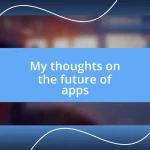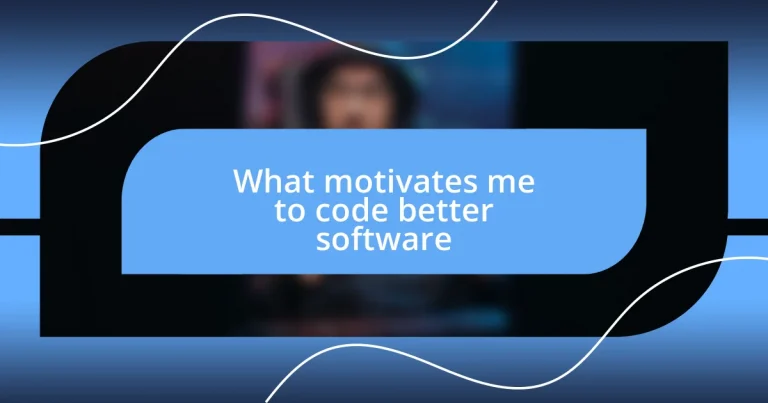Key takeaways:
- Coding motivation is driven by personal passion, community engagement, and the joy of learning new skills, creating a supportive environment for growth.
- Understanding user impact enhances the coding experience, as positive feedback and accessibility features reaffirm the developer’s purpose and responsibility to create meaningful solutions.
- Embracing feedback and measuring progress are crucial for continuous improvement, helping developers recognize their growth and inspiring them to tackle new challenges.
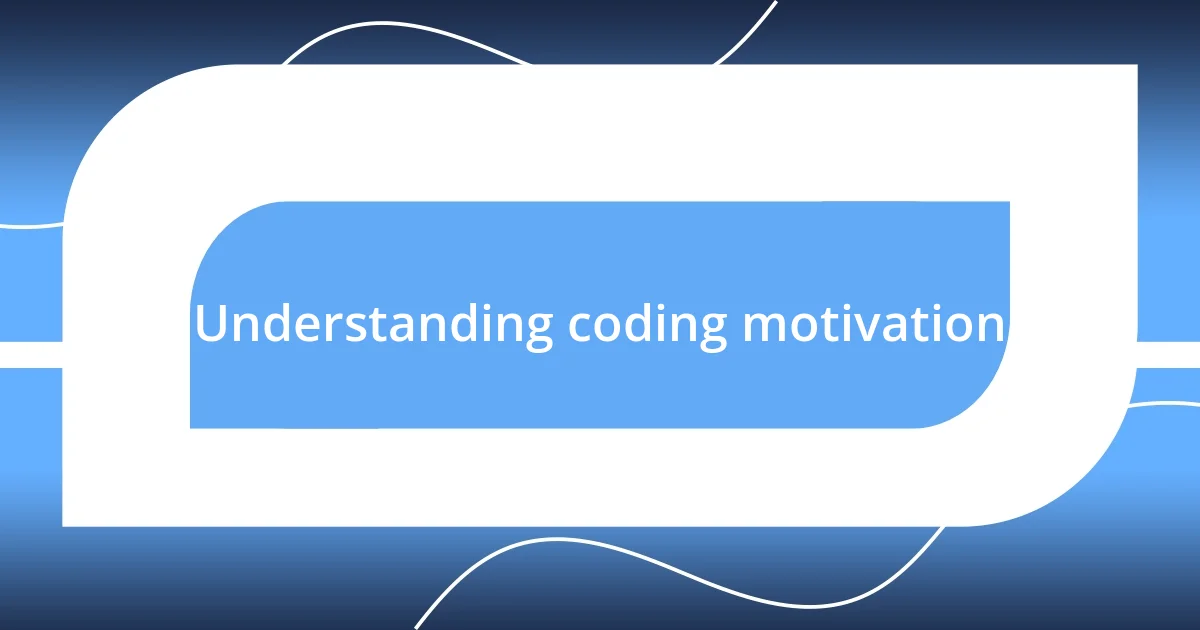
Understanding coding motivation
Coding motivation often stems from a blend of personal passions and external influences. For instance, I remember the first time I built a simple app that actually improved my daily routine. That moment sparked a fire in me, as I realized how software could solve real-life problems, which shifted my focus from just coding to enhancing user experience.
When I reflect on what drives me to code better, I find that the thrill of learning something new is a significant factor. It’s like opening a treasure chest filled with tools that make my approach more efficient. Have you ever felt that rush when you finally solve a difficult problem? That sense of achievement keeps me going, pushing me to explore more complex challenges.
The community aspect also plays a critical role in my coding motivation. Engaging with others who share the same passion creates an environment of support and growth. I often find inspiration from fellow developers; their diverse perspectives encourage me to elevate my skills. Isn’t it amazing how a simple conversation can reignite your enthusiasm for coding?
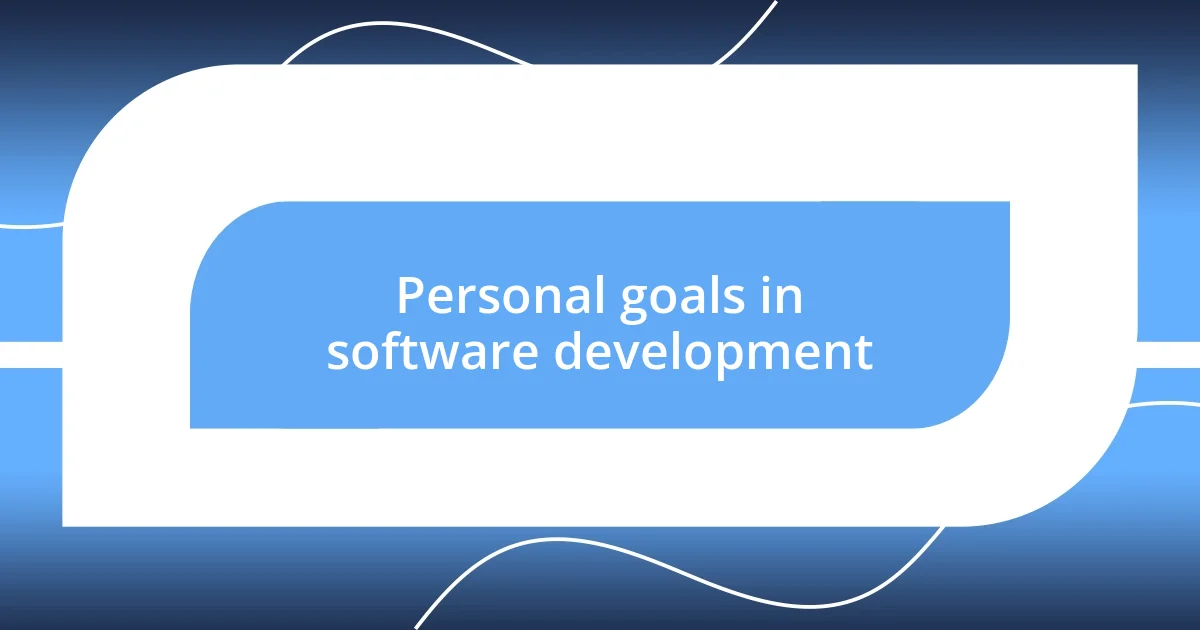
Personal goals in software development
Setting personal goals in software development can significantly impact my journey. For me, it’s vital to establish benchmarks that not only challenge my abilities but also align with my passions. One goal that stands out is committing to learning a new programming language each year. I vividly remember the satisfaction of diving into Python and creating scripts that automated mundane tasks. That experience not only sharpened my skills but also taught me the beauty of efficiency.
Here are some personal goals I strive for:
- Mastering New Frameworks: I challenge myself to explore a different framework every few months. Each new tool broadens my perspective on problem-solving.
- Contributing to Open Source: Giving back to the community by contributing to open-source projects has made me feel connected to something larger. It’s rewarding to see my code being used by others.
- Building Personal Projects: I set aside time to work on personal projects. This allows me to experiment without pressure, making learning enjoyable.
- Mentoring Others: Sharing knowledge with newcomers not only reinforces my understanding but reminds me of how far I’ve come.
These goals energize my coding journey and keep me committed to continuous improvement.
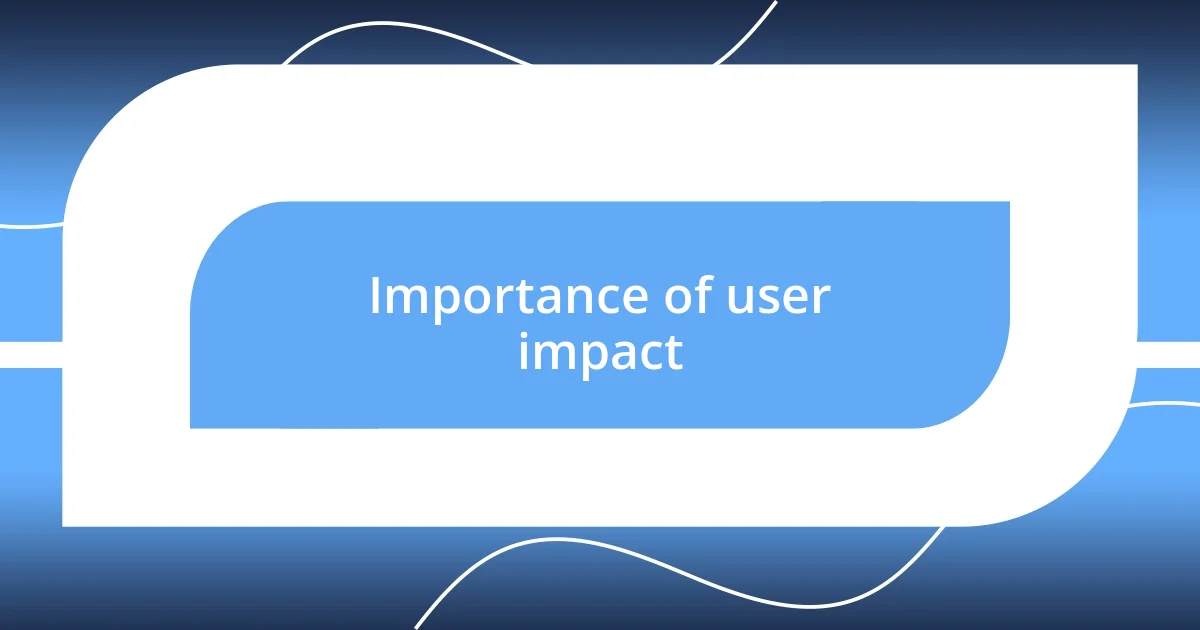
Importance of user impact
Understanding the user impact is crucial for me as a developer. Each time I see users genuinely grateful for a solution I’ve built, it pushes me to refine my skills even more. I remember a project where my software reduced customer wait times by over 30%. The smiles and positive feedback I received were priceless; it’s moments like that which make all the long nights coding worth it.
When software directly influences people’s lives, the stakes feel higher. One incident that stands out is when I made an accessibility feature that allowed a visually impaired user to navigate my app effortlessly. Hearing them share how it transformed their daily routine was a powerful reminder of why I code. The realization that my work enhances usability for people from all walks of life fills me with pride and motivates me to strive for better outcomes.
Ultimately, the importance of user impact lies in its ability to drive me toward innovation. Every line of code I write can change someone’s experience, and that level of responsibility fosters a deep commitment to creating powerful, intuitive solutions. Reflecting on this connection fuels my desire to continuously learn and adapt, ensuring my software is not just functional but truly beneficial.
| User Impact Aspect | Personal Reflection |
|---|---|
| User Feedback | Seeing users grateful for solutions motivates me to improve further. |
| Accessibility Features | Hearing how my solutions enhance daily lives keeps me passionate about coding. |
| Innovation Drive | The responsibility to create impactful software inspires my commitment to excellence. |
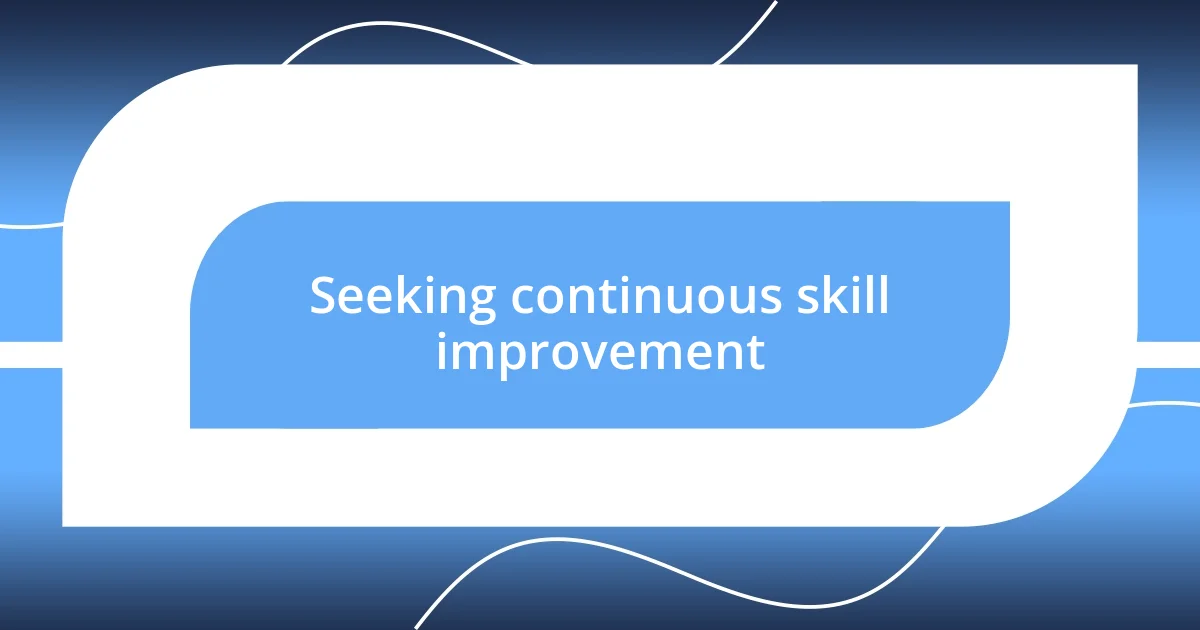
Seeking continuous skill improvement
Achieving continuous skill improvement is something I genuinely find exhilarating. Recently, I joined an online coding boot camp focusing on advanced algorithms. The challenge pushed me to think in ways I hadn’t before. I often wonder how much more efficient my programs could become if I fully grasped these concepts. The thrill of mastering something new makes those late-night study sessions so worthwhile.
I also make it a point to attend local tech meetups. Just last month, I spoke with a fellow developer who shared their approach to code reviews. It struck me—how can I improve my own feedback style to help others grow? Engaging in conversations like these not only broadens my understanding but often inspires me to implement fresh ideas in my own work. I find that the moments spent learning from peers can sometimes be the most enlightening.
Additionally, I often set challenges for myself. One summer, I committed to building a personal project from scratch using new tools and techniques. The excitement I felt when everything came together was unmatched. It made me ask myself, “What if I try integrating machine learning next?” This constant quest for skill enhancement has become a vital part of who I am as a developer, fueling my passion for creating better software every day.
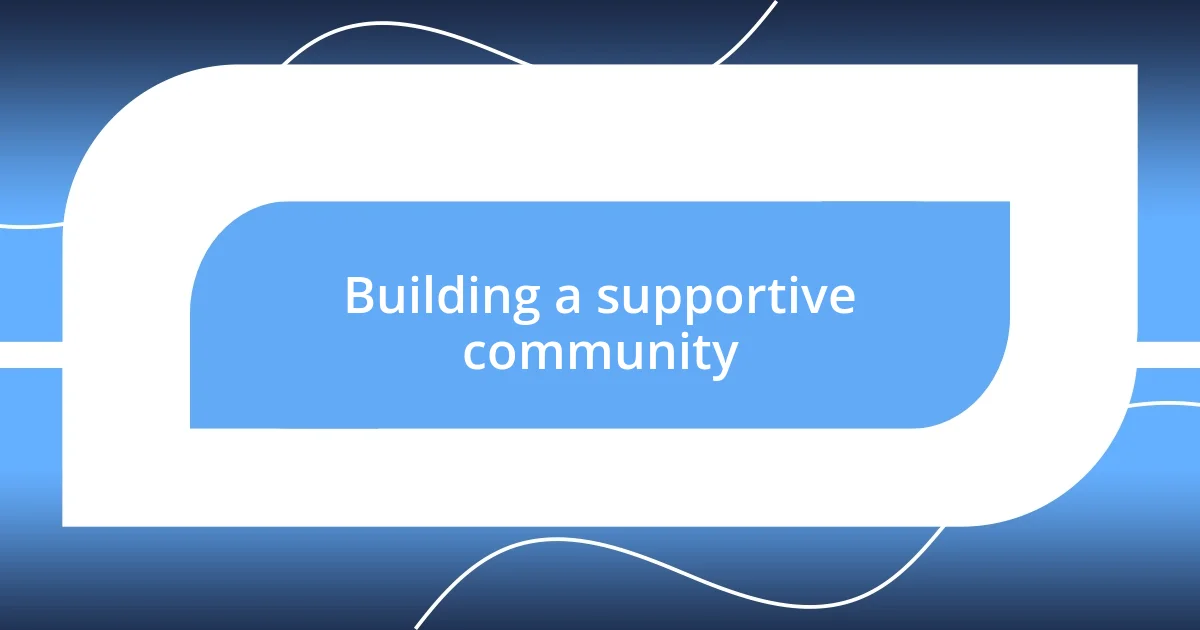
Building a supportive community
Community plays a significant role in my growth as a developer. I’ll never forget the time I attended a small hackathon near my town. The atmosphere buzzed with excitement, and I felt an instant camaraderie with fellow coders. We shared ideas and tackled challenges together, which led to a breakthrough in my project. That event opened my eyes to how a network of supportive peers can push us toward greater achievements. It makes me wonder: how many innovative solutions are sparked through collaboration?
In my experience, mentorship has been a vital component of building a supportive community. I recall reaching out to a senior developer when I was struggling with a complex coding issue. To my surprise, not only did they help me solve the problem, but they also took the time to explain concepts I hadn’t yet grasped. That moment highlights the power of giving and receiving support, reinforcing the idea that we all benefit when we help one another grow.
Additionally, online forums and social media groups have significantly enriched my coding journey. I once posted a question about debugging a stubborn piece of code in a forum and received thoughtful responses from developers around the world. The diverse perspectives opened my mind and provided new approaches I hadn’t considered. It’s incredible how technology enables us to create global communities where knowledge flows freely. This connection fuels my passion and encourages me to stay engaged, always eager to contribute my own insights.
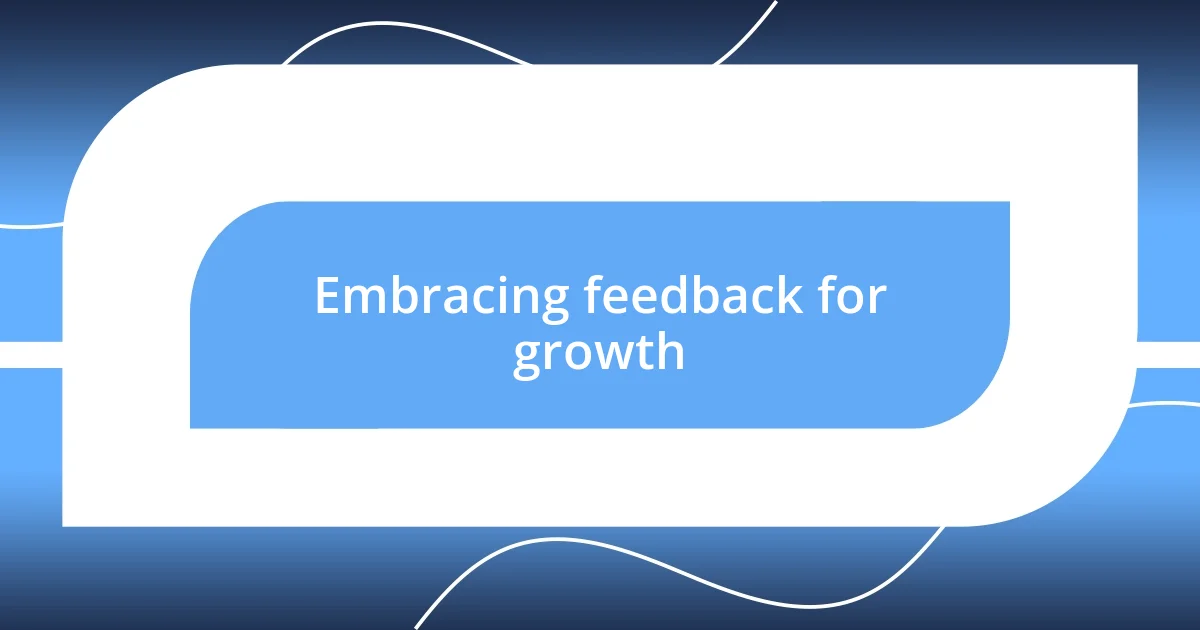
Embracing feedback for growth
Feedback is often the most potent tool for growth, yet I know it can be tough to embrace. I remember a time when I submitted code for a project and received comments that initially felt harsh. However, once I took a step back, I realized that those critiques were pure gold. They opened my eyes to blind spots I didn’t even know existed, motivating me to refine my skills and improve my approach. How many times have I missed opportunities for development because I resisted feedback?
Incorporating feedback into my coding process has truly transformed how I work. I now actively seek out peer reviews, eager to learn from others’ viewpoints. I recall a colleague who suggested a different method for structuring my code, which not only enhanced its readability but also its functionality. Their input helped me recognize that collaboration is a two-way street; the more I ask for opinions, the more I grow. Isn’t it fascinating how a fresh set of eyes can unlock new possibilities in our work?
I’ve also learned that feedback isn’t just about correcting mistakes; it can be a source of inspiration, too. Once, during a retrospective meeting, a teammate shared their success with a testing framework I hadn’t explored. It lit a spark in me, prompting me to delve into that framework, ultimately elevating my projects to new standards. I wonder how many innovative ideas remain undiscovered because we shy away from constructive feedback. Opening myself up to this kind of dialogue has not only improved my coding but has also enriched my development journey.
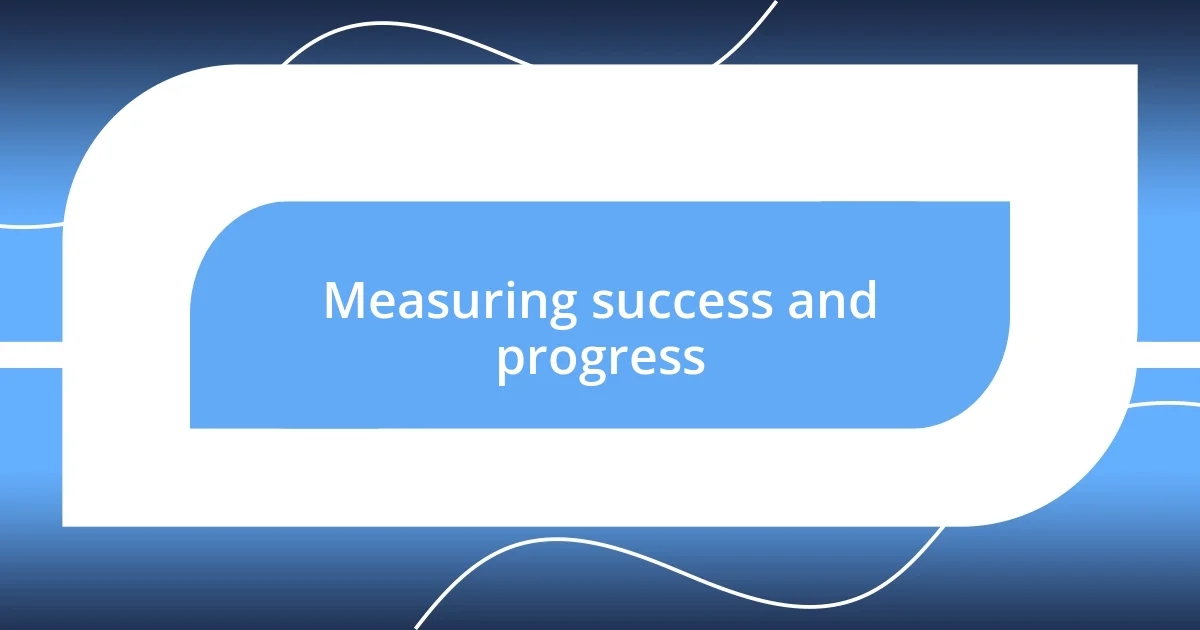
Measuring success and progress
Measuring success and progress as a developer can be quite subjective. For me, it’s about looking beyond just the lines of code produced or the features delivered. I remember a project where I aimed to implement a new algorithm. Initially, I was focused on its complexity, but as I reflected on my journey, I realized that the growth in my problem-solving skills was the real achievement. Isn’t it interesting how our perspective shifts as we navigate through challenges?
I also like to set personal milestones. One time, I decided to devote a month to mastering a new programming language. At first, it felt overwhelming, but as the days passed, I tracked my progress through small projects and exercises. I’d celebrate little victories, like finally debugging a tricky section of code. Those moments of accomplishment fueled my motivation, reminding me that every small step is crucial for long-term success.
Metrics can be helpful too, especially when tackling larger projects. After completing a significant sprint, I would analyze not only the number of tasks closed but also the quality of each submission. I remember comparing the bugs reported in my earlier work to my more recent projects. That stark contrast showed not just improvement but a tangible reflection of my growth as a coder. How often do we fail to appreciate the progress we’ve made because we’re constantly looking ahead? Embracing these measurements helps me recognize how far I’ve come and informs my future direction.








